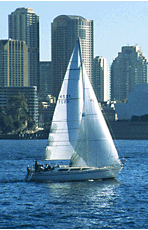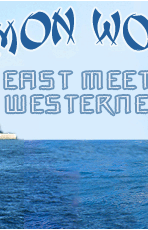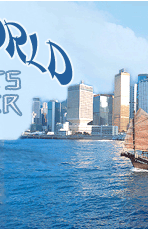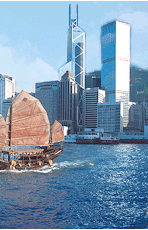Nightlife may be a stretch, but there's no shortage of fine dining in S'pore. The population is diverse and wealthy enough to support a great mix of Asian and Western fare. One of the things I miss really.
Posted by Myrick at November 8, 2006 12:07 PM
I couldn't withhold a chuckle. Country brand? surely this index is conducted by Singaporeans...
Posted by anicepen at November 9, 2006 11:50 AM
"The ministry said there was no special emphasis on the review of sexual offences. It said other proposed amendments, including strengthened prosecution of credit card fraud and the extension of several offences to the electronic media, could have a great impact."
Not half the impact of the relaxing of the anal passage in the laws, one suspects.
Posted by hugh at November 9, 2006 02:36 PM
I rather thought the claim about the US having the best retailwas amusing. Surely it must be talking about New York, but it conjured up visions of the wonders of the 24 hour Walmart!
Posted by HK Dave at November 10, 2006 06:01 AM
Nice site!
http://brbgwgqo.com/mjzu/pkey.html | http://lzmzghsi.com/ymqb/nmcx.html
Posted by May at November 15, 2006 02:03 PM
Good design!
Posted by Kathy at November 19, 2006 08:30 PM
Good design!
Posted by Nicole at November 20, 2006 08:37 AM
Great work!
Posted by Terry at November 20, 2006 08:39 AM
Good design!
Posted by Greg at November 23, 2006 08:31 AM
Good design!
Posted by Michelle at November 25, 2006 08:24 AM
Good design!
Posted by Freda at November 26, 2006 08:34 AM
Great work!
Posted by Quentin at November 26, 2006 08:34 AM
Thank you!
Posted by Olga at November 27, 2006 09:38 AM
Great work!
Posted by Patty at November 27, 2006 09:38 AM
Great work!
Posted by May at November 30, 2006 08:58 AM
Great work!
Posted by Adam at November 30, 2006 08:59 AM
Good design!
Posted by Otto at December 2, 2006 07:48 PM
Well done!
Posted by Carl at December 2, 2006 07:49 PM
Good design!
Posted by Pamela at December 2, 2006 07:49 PM
Nice site!
Posted by Roy at December 5, 2006 06:32 PM
Thank you!
Posted by Otto at December 7, 2006 08:57 PM
« hide
comments
Debate: Is this Asian values, or rich assholes who fear the ''under'' class and popular dissent?
Posted by bean counter at September 29, 2006 02:26 PM
"The Chinese are learning a thing or two on media control from them Singapore."
The chinese are learning from the CHINESE on media control in Singapore. Just a case of the diasporic imperiums of the chinese herd sharing p2p info.
Why do you think they harp on bringing back chinese culture in singapore at the expense of multi-racial harmony? It's a culture that creates subservience and which, in turn, makes 'control' a thing of the past as the human and humane mind is relieved of those aspects that can feel the pressure of 'control'.
Posted by wonderer at September 29, 2006 03:19 PM
You'll have to explain the above, wonderer. No offence intended, but I don't have a freakin' clue what you're talking about.
Posted by bean counter at September 29, 2006 04:07 PM
Interesting that the repressive anti-liberal laws in Singapore were a legacy of the British colonial era. As was the case in Hong Kong.
Posted by shwe at September 29, 2006 10:03 PM
I think what wonderer is referring to (correct me if I'm wrong) is the deep-rooted subservient character of ordinary folks embedded in the Chinese culture, as a result of thousands of years of imperial rule and feudalism in an agricultural society, which basically consists of two classes: the rulers and the subjects. As long as the subjects regard themselves as such, which they do, even in today's Chinese societies, there's little need to "control" them. It is this cultural characteristic that makes it so difficult for the notion of democracy to penetrate Chinese societies (including Hong Kong).
Posted by Legolas at September 30, 2006 02:38 AM
Legolas is right.
However, please also remember that Singapore is a *rich* third-world country/city-state ruled by a lunatic ar*ehole and his offspring.
If you research enough, you will find a genetic link between Lee Kwan Yew (the Singapore chimpanzee) and Kim Jong-il (the North Korean monkey).
Even Mainland China citizens (the real Chinese) protest against the dubious policies of their communist rulers. But Singapore Chinese are impotent hybrids who dare not say anything against or to their dictator(s).
It's a pity. Really.
Auf Wiedersehen! Or should I say "Ciao!"
Posted by Bull at October 1, 2006 04:22 AM
BTW, after having said all of the above, the fact is that Singapore Airlines' girls are pretty and sexy. They should bonk around to enrich their failing genetic pool.
Auf Wiedersehen!
Posted by Bull at October 1, 2006 04:29 AM
Chinese subservience, as manifest in the level of mass uprisings and protests in China per year?
http://www.zonaeuropa.com/20060120_2.htm
Posted by shwe at October 1, 2006 09:31 PM
Indeed, the tide appears to be turning at long last, thanks to the internet and globalization. The question is: when will the tipping point be reached - when will true democracy find its footing within Asian countries with ethnic Chinese societies? Do Chinese people really want democracy, or they just want benevolent rulers (wishful thinking)?
Posted by Legolas at October 2, 2006 12:33 PM
i very much doubt what happens in China has anything to do with globalisation and the internet, except in the sense in which global capitalism has created greater inequality. These assertions about Chinese cultural deference really don't get borne out by Chinese history.
Posted by shwe at October 2, 2006 05:25 PM
I often ponder over the reasons why Sun Yat Sen was not able to convince the Chinese to believe in democracy, and why the Chinese people chose to adore Mao and regard him as an emperor. Doesn't that have anything to do with inborn submissiveness, based on historic cultural values? Chip Tao blamed it on the Chinese DNA. I would regard it as a result of historic and circumstantial factors. History definitely has played a part in forming the people's attitudes towards politics and cultural values.
Posted by Legolas at October 3, 2006 02:08 AM
Perhaps it's not so much submissiveness to authority as to fate.
Posted by Legolas at October 3, 2006 04:10 AM
I'm always a little confused at where this notion of submissiveness in the Chinese body politic came from. China has probably had more rebellions, civil wars, and insurrections than any other nation around.
Posted by Jing at October 4, 2006 07:20 AM
I think it's something that westerners conjure up to explain why they dont' see huge insurrections and fights to the death over democracy.
Posted by bean counter at October 4, 2006 09:26 AM
The submissiveness in Chinese culture comes from the Confucian concept of filial piety. It comes from the entire society being told to respect the elders and leaders. The entire Chinese education system from 300 BC onward was setup to drill respect elders and parents, hardwork, be humble, respect elders and parents, work hard, be humble, respect elders and parents.
Additionally Taoism and Buddhism both contain rather strong strains of fatalism. Reincarnation means you get what you deserve based upon a prior life. So if you deserve it you cannot complain.
I would not put Lee Quan Yu in the same class as Kim Jong Ill. I would certainly live in Singapore rather than North KOrea if I had the choice. Indeed, I don't see Singapore as being any more repressive than the UK.
Posted by Fai Mao at October 5, 2006 01:08 PM
Re: Bull's comments "But Singapore Chinese are impotent hybrids who dare not say anything against or to their dictator(s)."
Who are you to comment about Singapore Chinese if they choose to live within a system that you disagree with? By voting for the 'dictator(s)', it does not mean they are impotent. They have exercised their right for a system they want.
Trust me, it's not necessarily all fear-driven: that's only something the Western media and liberal critics would like to believe.
Speak only when you yourself have personally stood up to the failings of your own government, whichever it is.
Posted by thecatman at October 5, 2006 04:20 PM
Fai Mao, thank you for your elaboration on Chinese history and culture. Most Westerners think they understand the Chinese people but in fact they don't.
Posted by Legolas at October 6, 2006 02:00 AM
I would question that Fai Mao knows anyting about Chinese culture?
reincarnation means ''Fatalism?'' What a poor understanding of an Eastern philosophy. Sounds like a westerner repeating half of what he or she read during a sleepy all-nighter in the college library in Akron, Ohio. Not at all accurate. Reincarnation is the opposite of fatalism.
Posted by bean counter at October 6, 2006 10:38 AM
at the FEER party tonight, Hugo Restall quoted Lee Kuan Yew as saying that democracy can't survive without a free press.
''This was probably when he was still the opposition,'' said our fair noble editor.
now back to improving Hong Kong-US-Taiwan-Malaysian relations
life is good.
Posted by pooty tang at October 7, 2006 04:28 AM
This is off topic- sorry. I got this address from someone posting on forumosa.com- a taiwan site started by expats. I would like comment on the following: HK polls taken over several years (sorry I don't know how to link, but I'll try to get an address if you don't know which one I'm talking about) basically show that HKers seem satisfied with 'one country two systems', yet there are still well attended democracy protests in HK every year. How can I reconcile this?
Posted by vera Darmo at October 7, 2006 06:02 AM
errr...exactly what needs clarifying? The two are perfectly compatible.
Don't think its chineseness as much as it is a population starved of information. If there was ever clear evidence of a need for free speech and open exchange of environment, it's here in the comments section of this post about Andy Xie.
http://www.mrbrown.com/blog/2006/10/morgan_stanleys.html
The level of discussion and ignorance is abysmal.
Posted by xiaobao at October 8, 2006 12:24 AM
FEER could write what they like.
The Singapore Leaders could sue if they believe their reputation is tarnished.
Hey, its all the same throughout the world!
But Singapore Laws have little power in Hongkong. If Hongkong ignores Singapore, then relations could be worse? No? But its Hongkong's right.
So at best Singapore Government could just ban FEER in Singapore!
But if FEER puts a joke such as Chee (I am ashamed to say he is my fellow Singaporean)in even a little good light, FEER's reputation could be seriously damaged.
Posted by Desmond at October 10, 2006 11:57 PM
csHi. This is my links. drunk rape
http://viol.upjm.com/rape-in-iraq.html
youth rape
http://viol.upjm.com/raped-boy.html
hot rape
kasumi rape game
little girls raped
http://viol.upjm.com/violent-fuck.html
http://viol.upjm.com/rape-survivors.html
http://viol.upjm.com/little-rape.html
Posted by angel at October 18, 2006 06:38 AM
« hide
comments
I agree with you that the law is as it is in Singapore and you would know that on the plane but with one caveat (when looking at the larger picture). There is a distinct double standard when the Singaporeans happily hang a mule, who is usually recruited because they are in a desperate state, and then at the same time the Singapore government uses its citizens tax dollars to help prop up one of the regimes that leads the way in drug production - Burma - through investment.
Posted by Phil at November 30, 2005 08:10 PM
Just let him die. Really. If we really believe that basic human rights are so important, stripping him of these rights for the rest of his life ought to be a more inhumane torture than just taking away his life.
Posted by spacehunt at December 1, 2005 01:10 AM
Phil, I agree on the double standard. But even if it's only mules getting caught and punished, thems the rules.
That said, they should let the poor b@st@rd's Mum give him a hug.
Posted by Simon at December 1, 2005 08:17 AM
Mr. Singh's comments reveal how every culture, in my opinion, has its fantasies about punishment and power domination. The fact that people even want to know about this from his perspective is a sign both of the normal curiousity that inflames us all, but also of the need for socities to legitimize that certain members of their community keep the rest of society in control.
Sick, if you ask me.
Posted by doug at December 1, 2005 09:24 AM
One could try unfurling a banner saying "Democracy Now" in Singapore (if it only had a heart) as well. Result would be the same I think.
Vale, Nguyen Tuong Van.
E@L
Posted by expat@large at December 1, 2005 02:17 PM
http://www.richard.clark32.btinternet.co.uk/contents.html
Posted by gunlaw at December 1, 2005 03:05 PM
So sad... another life will be terminated prematurely tomorrow at 6 am.
Posted by GhOsT at December 1, 2005 09:20 PM
Mr. Nguyen did not commit murder, instead he should have been granted clemency. The Singapore Govenment is too harsh. They could have used this life to do some work.
I am totally disgusted with Mr. Singhs job. He has tarnished the rest of the Singhs around the World with his job. (Singhs believe in a religion call the Sikhs) we are very respectable people and do not preach on Barbaric, brutal, cruel and degrading and inhuman acts.
We believe in honest living. By hanging some one for a living is not honest living. He seems to make his (victims) the prisioners suffer this is clear as he meantions to the media that they "run like chickens and are like fish out of water". Obviously he finds it fun to see them suffer.
Either he is not a singh, or is giving the rest of the World a bad impressions about Singhs.
He owes an apology to the rest of the Sikhs "Singh" for degrading our name.
We singhs in the rest of the World preach on equality, brotherhood, justice and truth.
Posted by Amy at December 8, 2005 05:18 AM
« hide
comments









